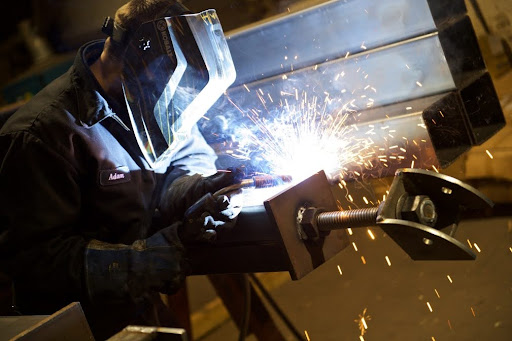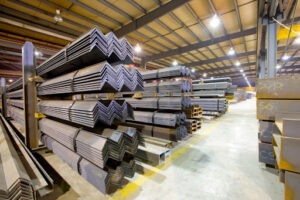
What Factors Impact Steel Prices and Supplier Value?
Price is what you pay; value is what you get. That distinction is important in any transaction but is particularly important to remember when purchasing steel. The factors impacting steel prices, from the raw materials to the final project application, can be complex and outside many suppliers’ control. In this post, we will explore the confluence of influences on Midwest steel prices—and ways Westfield Steel controls the value customers receive despite fluctuating pricing factors.
Traditional Factors Affecting Steel Prices Steel Prices
Traditional factors affecting steel prices are key to understanding the dynamics of the steel market. These factors can affect the cost of steel at any given time and can fluctuate due to a variety of economic, environmental, and geopolitical reasons.
- Supply and Demand Dynamics: The most fundamental economic principle impacting steel prices is supply and demand. When the economy is booming, construction, manufacturing, and infrastructure projects often increase, leading to higher demand for steel. Prices will rise if the supply doesn’t keep up with this demand. Conversely, steel demand can drop during economic downturns, leading to lower prices if the supply remains constant or increases.
- Energy Prices: Steel production is energy-intensive, and fluctuations in energy prices, such as coal, natural gas, and electricity, can directly affect steel production costs.
- International Trade Policies: Tariffs imposed on steel imports can increase domestic steel prices by limiting supply, while trade agreements can lower prices by removing barriers to steel imports.
- Currency Exchange Rates: A weaker currency makes imports more expensive and exports cheaper. Conversely, for countries exporting steel, a stronger currency can make their steel more expensive in global markets, potentially affecting international demand and prices. Most industrialized countries have government actions that try to manipulate exchange rates to help exports.
- Raw Material Costs: When the prices of raw materials increase, it becomes more expensive to produce steel. In the US, that is mostly steel scrap going into electric arc furnace mills.
- Economic Indicators: General economic conditions, such as inflation, GDP growth rates, manufacturing activity, and construction spending, can provide insights into steel demand. Positive economic indicators can lead to higher demand and prices, while negative indicators can have the opposite effect.
- Technological Advances: Improvements in steel production technology can reduce production costs and increase supply, potentially lowering steel prices. However, adopting new, more expensive technologies can initially lead to higher prices until the costs of these technologies decrease over time.
Five New Trends Affecting Steel Prices
The World Steel Association has identified five “megatrends” expected to shape the future of the global steel industry. These megatrends reflect broader global changes and challenges that significantly impact demand, supply, production processes, and the overall strategic direction of the steel sector.
- Geopolitical Instability: Geopolitical dynamics significantly influence global economic integration, affecting trade flows, access to raw materials, and investment decisions. Conflicts, trade disputes, and shifting alliances can lead to uncertainty, affecting the global steel market’s stability and predictability.
- Technological Advancements: The rapid pace of technological innovation is transforming the steel industry. From developing advanced materials to adopting Industry 4.0 technologies such as artificial intelligence (AI), the Internet of Things (IoT), and blockchain, technology is reshaping production processes, improving efficiency, reducing environmental impact, and creating new market opportunities.
- Environmental and Climate Change Concerns: Growing awareness of environmental stewardship among consumers and investors and regulatory action on environmental issues and climate change are prompting the steel industry to adopt cleaner, more sustainable production methods. Many of the larger steel mills have launched initiatives for “greener” steel or carbon-neutral steel production. Whether these are genuine initiatives or marketing buzzwords, they will most likely cause increases in the price of steel.
- Urbanization and Infrastructure Development: The continuing trend of urbanization, especially in emerging economies, is driving demand for steel in construction and infrastructure projects. Developing smart cities, transportation networks, and sustainable buildings require large quantities of steel, presenting growth opportunities. However, this trend also challenges the industry to meet these demands sustainably and efficiently.
- Changing Demographics and Consumer Preferences: Demographic shifts influence steel demand patterns, including aging populations in developed countries and growing middle classes in developing nations. Consumer preferences are also evolving, with increasing demands for sustainable and high-quality products. These changes impact the types of steel products needed and the sectors where steel is in demand, from automotive to packaging.

Westfield Steel’s Role in Pricing and Value
Fluctuations in steel prices rely on a complex interplay of global and local factors—nearly all outside the direct or indirect control of steel suppliers and fabricators like Westfield Steel.
- Value-Added Services: That doesn’t mean we can’t do our part to provide exceptional value on the price you pay for your steel. The full cost of ownership should be considered when determining the value of any purchase. One steel supplier may be able to offer a lower price than others on I-beams or hot-rolled steel sheets, for example, but do they also offer the cutting, coping, stamping, or forming your final products call for? Accountability to our customers is Westfield Steel’s top priority on every order, offering value-added services to meet any need and exceed expectations.
- On-Hand Inventory: While steel suppliers can’t influence global trade disruptions and prices across the free market, Westfield Steel avoids supply chain issues by maintaining our inventory of in-stock parts and materials. With a vast and diverse inventory of steel products always on hand across three regional distribution centers, Westfield Steel can consistently meet our goal of less than 5% of items ever needing to be on backorder.
- On-Time Delivery: Reliable, on-time delivery is our calling card at Westfield Steel, where customers enjoy a better than 90% success rate on exceeding our promised delivery deadlines. Our authorized-for-hire carrier and subsidiary, Westfield Steel Express, features a dedicated fleet of 20 trucks—which means faster, more frequent deliveries to our customers. As a result, we’re proud to say that less than 1% of all shipments ever result in a customer complaint or a necessary return.
We cannot control all the aspects influencing pricing, but we can ensure you get value and more bang for your buck with value-added services. By taking ownership of our distribution and delivery services, customers can count on having high-quality products on site and in hand when we say they’ll be there. Reach out to talk to a steel expert, hear more about what we can do with steel for you, and request a free custom quote today.
Back